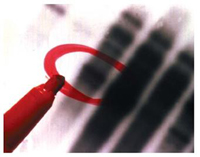Thanks to William Haseltine, already we can utilize genes to cure disease and improve our quality of life. Not many would object to the new medicines, because they can only help people. Gene testing is one of the new methods to test for genetic disorders, and consists of scanning a patient's DNA sample for mutations and abnormalities. Although the test is not quite perfected, they can clarify diagnoses and identify people with genetic disorders, allowing families to avoid having children possibly infected with the disease.
Yet with the rise of gene-based products comes not only cures and medicines, but more practical products. There's no doubt many people will want to use biotechnology to their advantage, not for diseases or disabilities burdening their lives, but for smaller, more trivial things. Behavioral genetics studies the direct correlation between an organism's behavior and the impact of its heredity and environment.
There is much evidence that behavior has a biological basis, including the idea that behavior breeds true, allowing some behaviors to run in species and even families. In 1999, a molecular biologist succeeded in altering mice's intelligence, enhancing their ability to retain information by inserting a gene that codes for a certain protein in brain cells associated with memory.
Dubbed as the "smart gene," the news of this gene gave rise to talk of being able to control other behavioral traits and physical characteristics. Soon we'd be able to engineer embryos to have an IQ of over 200, to have blue eyes and brown hair, to be the perfect child of an imperfect family. It would be a more sophisticated plastic surgery, without the crude knives and manual altering of physical traits. The question is, is this alright? Is it alright to genetically alter a human to have more desirable traits? Is it alright to play God?

While some people are determined to not use science to unnaturally enhance themselves or their children, they may be unsure on whether or not to use genetically based technology to cure diseases and disabilities. Ridding the world of disease, helping disabled people overcome their disabilities once and for all, of course sounds like a good thing. However, just like with behavioral genetics, we must ask ourselves, is this ok, to unnaturally cure someone of a disability? Yet even beyond the idea of playing God is this idea that disabilities and diseases are something that need to be cured. Underneath the simple cure, the simple improvement in the quality of life, is the implication that the disabled need to be fixed. They are not quite normal, not on quite the same league as those who were born without genetic handicaps. Just like in the Eugenics movement in the Holocaust, we can forcefully prevent disorders from developing in future generations, but should we? While some may be insulted at this effort to "cure" disease, it is a matter of whether or not the burdens of a disability outweigh the idea of inferiority. Although getting cured is almost admitting that they are not quite good enough, that they must be better, the disabled themselves must decide if they wish to acknowledge these implications or not.
While these are things to consider with the advancement of biotechnology, we are still not quite at that stage yet. It seems the mice in the laboratory had one gene inserted, and all of a sudden they became smarter, allowing us any enhancements we may desire. In reality, the memory and learning improvements seen in the mice were very short-term, ranging from a few hours to a few days. Behaviors and traits are controlled by multiple genes, making it very difficult to actually alter any one aspect to a human's personality. We still don't know the exact relationship between genes, proteins, and any particular trait. Even with the possible discovery of behavior-altering genes, William Haseltine and HGSI certainly do not condone using genetic technology to help drive smaller, more trivial desires. When asked in an interview if his technology will be used to help someone simply desiring to be taller as opposed to someone desiring a cure for a disease, he said,
"We certainly don't see that in the near horizon. There are certainly concerns and you have to acknowledge those concerns. ... We can improve the body by restoring health. I don't know if we yet know how to make it better or different from what it already is."
Haseltine's medicine will be used to help cure diseases and help the people, but he does not plan on having it satisfy the unnecessary wants of the vain. In his mind, the human is already at its peak; it does not need altering.
Excerpt from an interview with Motley Fool and William HaseltineDavid: When you say stimulate the body to regrow itself, is there not a concern on the ethical side of the business that humans will begin using this technology not to regrow, but to grow things that did not exist before and change their biological makeup for, let's say, vanity as a driving reason and certainly other reasons as well. Will it not be just going to the doctor and saying, "Can you help cure this disease?" but also, "Can you make me 6'4" tall -- I'd like to dunk a basketball."
Haseltine: We certainly don't see that in the near horizon. There are certainly concerns and you have to acknowledge those concerns. But I think the way to think about these medicines is you now go to the doctor and he says, "I'm afraid you have diabetes. We can now give you a purified manufactured human substance called insulin." It's grown up and manufactured. It's no longer purified from pigs or other animals. Here a child comes in, the child is destined to not grow very tall. We can now give him growth hormones. It will be a much more natural medicine to enhance what the body can do. It's a much harder task. One we really haven't learned how to approach to actually change what the body is. We can improve the body by restoring health. I don't know if we yet know how to make it better or different from what it already is.
Return to Top



